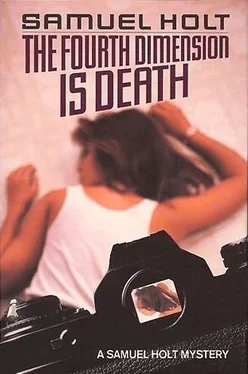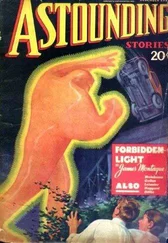It was ten minutes more before I was called; then Miss Colinville turned to me with almost a hint of thaw in her expression as she said, “You can go on in now. You remember the way, don’t you?”
“Sure do, beautiful,” I said, getting to my feet. I winked at her. “I’ll miss you.”
Her lips curled with scorn, and she turned back to her duties. Still grinning, I went through the doorway and down the hall to Kay Henry’s room, where Henry was pacing back and forth and Rita Colby was seated on one of the gray sofas, legs crossed, top leg fretfully moving.
At first, I was too interested in my own performance to really pay much attention to anybody else in the room. How would Ed Dante — this Ed Dante — react to the presence of Rita Colby? I decided he’d be awed, but that he’d try to cover it by clumsy joking mixed with overelaborate compliments. So, upon seeing the woman seated there, I immediately crossed to her, went down on one knee like a medieval knight, pressed both hands to my heart, and said, “Miss Colby, I’m your biggest fan. It’s an honor to breathe the air in the same room with you.”
She gave me a look of amused disbelief. “Well, that’s baroque,” she said.
“And I want you to know,” I went on, twinkling Ed Dante’s personality at her like mad, “when I dream of you, I’m always respectful.”
Laughing, but at the same time making a graceful brushing-away gesture in my direction, she looked up at Henry and said, “Make him stand up. I want a look at him.”
Immediately, I popped to my feet, swept off an imaginary musketeer’s cap, and performed a broad low bow, saying, “Ed Dante at your service, Madame.”
“Yes, fine, just stand there,” she said, sounding a bit impatient with me.
So I just stood there. I never wanted to take this character so far as to get him — and me with him — thrown out of anywhere. I stood, and Rita Colby looked me up and down, critically, studying me as though I were a piece of furniture she might add to the guest room. She made a waggly circling gesture with one down-pointing finger, so I turned in a slow circle, ploddingly, putting it on a little too broadly so she’d have to know this was another tiresome joke. When I faced her again, she said (to Henry, not to me), “Well, the moustache will have to go.”
“Oh!” I said, in pain, and put one hand up to touch three protective fingertips to that narrow line of hair above my lip. (An impish desire came over me to yank the thing off and hand it to her, saying, “Well, if you don’t like it, we’ll get rid of it.” Which would have been very foolish and very dangerous, so I didn’t do it.)
Meanwhile, Kay Henry was saying, “I know what you mean. But let’s not redesign the man until we know what we’re doing.”
“And whether or not,” she commented, “we want to do it at all.” Then, more irritably, she said, “You know, we don’t have to cast that part this early. The circumstances aren’t the same any more.”
I listened intently, frozen there with my fingers against my moustache, feeling myself invisible inside this other personality, listening to them, waiting for them to say more, and thinking that Rita Colby didn’t sound like a person referring to a part that had been given to a lover.
“I know, dear, I know,” Henry said, soothing her, sounding well practiced at soothing her. “But Ed’s here, and Julie Kaplan told him about the role, so why not look him over.”
“Fine,” she said, brisk and impatient. “We’ll look him over.” And she looked at me, making a business of it (more subtly than my bits), and said, “Well, he’s tall enough. How tall are you?”
“Six foot six, Mum,” I said, and released my moustache to tug a forelock. “Up a half.”
She ignored that. “Have you ever played Nazis?” she asked me.
“I beg your pardon?”
“Nazi soldiers,” she explained. “Gestapo men, that sort of thing. They usually cast big boys like you in that kind of part.”
“As a matter of fact, yes,” I said. And it was true; before PACKARD, the occasional one-shot small television roles I’d landed had included a couple of German soldiers in World War II stories.
“Good,” she said, and pointed at Henry. “Go arrest him.”
Very clever. It was a simple little exercise, a two-dimensional character I already knew, a scene I should have no trouble improvising. If awkward, jokey, pushy Ed Dante showed through the character, that would be the end of it; she’d have no further use for me.
So now what? It seemed to me I’d better play the part as well as I knew how, that being the only way I could prolong this conversation. So I stepped back, lowered my head to think about it and to get all this other extraneous stuff out of the way, smoothed my jacket and tie to a better semblance of neatness, lifted my head, and looked over at Henry. I was aware of Rita Colby, of course, out of the corner of my eye, but I paid no attention to her. “Herr Henry,” I said. I was doing just the faintest hint of an accent, no music hall stuff.
Henry played along fairly well, though with a distracting little grin: “Yes, officer?”
I stepped toward him, arms bent, hands out in front of me, turning palms up to indicate my helplessness as I said, with a touch of sympathy, “I am afraid, Herr Henry, they have sent me to bring you in.”
His eyes widened. Overacting, he hunched up his shoulders — amateurs always do too much — saying, “But why? What have I done?”
“You know, Herr Henry,” I said. “And they sent me, you see, because we know each other.” Again I did the gesture of helplessness. “They know that, you see. They know everything.”
He looked more honestly worried. He said, “But— What’s going to happen?”
“Bad things,” I told him. “It might be better for you to try to run away. Faster. Cleaner.” More sympathy showed: “I promise I won’t miss.”
“By God,” he said, breaking character, “you’re scaring the shit out of me.” Looking past me at Rita Colby, he said, “Well? Is that enough?”
“It is,” said her voice, cool and thoughtful. I turned toward her, grinning, and she said, “I’m very impressed, Ed.”
“That’s great, coming from you, Miss Colby,” I said. Then I ducked my chin down, and grinned wide-eyed at her, and said, “But I’m better, you know, playing a lover.”
She didn’t pick up that cue. In fact, she was all business, and not at all what Tom Lacroix, for instance, would have anticipated. Telling me I shouldn’t think I definitely had the role, that others would have to be consulted — playwright, director, two producers — and that the casting wouldn’t in any event be made until January, she nevertheless sat me down in Henry’s office and described the play and my part in it; or, that is, the part I was being considered for.
Four Square was a suspense romantic comedy about a ménage à trois nearly becoming a ménage à quatre, and also nearly becoming a murder mystery. The principal characters were a United States senator, his wife and his longtime secretary, with whom he’s been having a longtime affair. Rita Colby would be playing the secretary, who has now fallen in love with a younger man, a television news anchor; once Dale Wormley’s part, now possibly Ed Dante’s. The ‘switch’ in the story was that the wife didn’t want her husband’s affair with the secretary to end; it had provided a stability and safety in their lives, and without the secretary the husband might go off and become involved with women who would lead him into scandal and disgrace and loss of the next election.
Therefore — I suppose they could make this seem fairly reasonable — the senator and his wife proceed to scheme to murder the news anchor. But when the wife meets the news anchor — the character appears only in two brief scenes, of which that was the second — she also falls in love with him. When she tries to stop her husband’s murder scheme, things go wrong, and at first it seems as though the senator has been killed by his own plot, at which point the secretary realizes it was the senator she truly loved all along. So , when the senator turns out to be alive, the couples switch, the senator and his wife amicably divorce, she goes off with the news anchor and the senator marries his secretary.
Читать дальше












